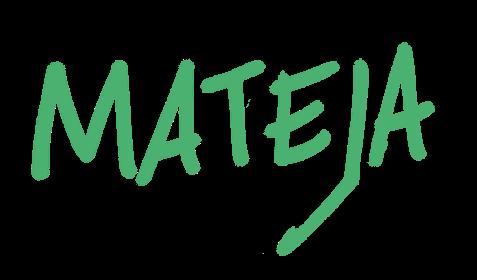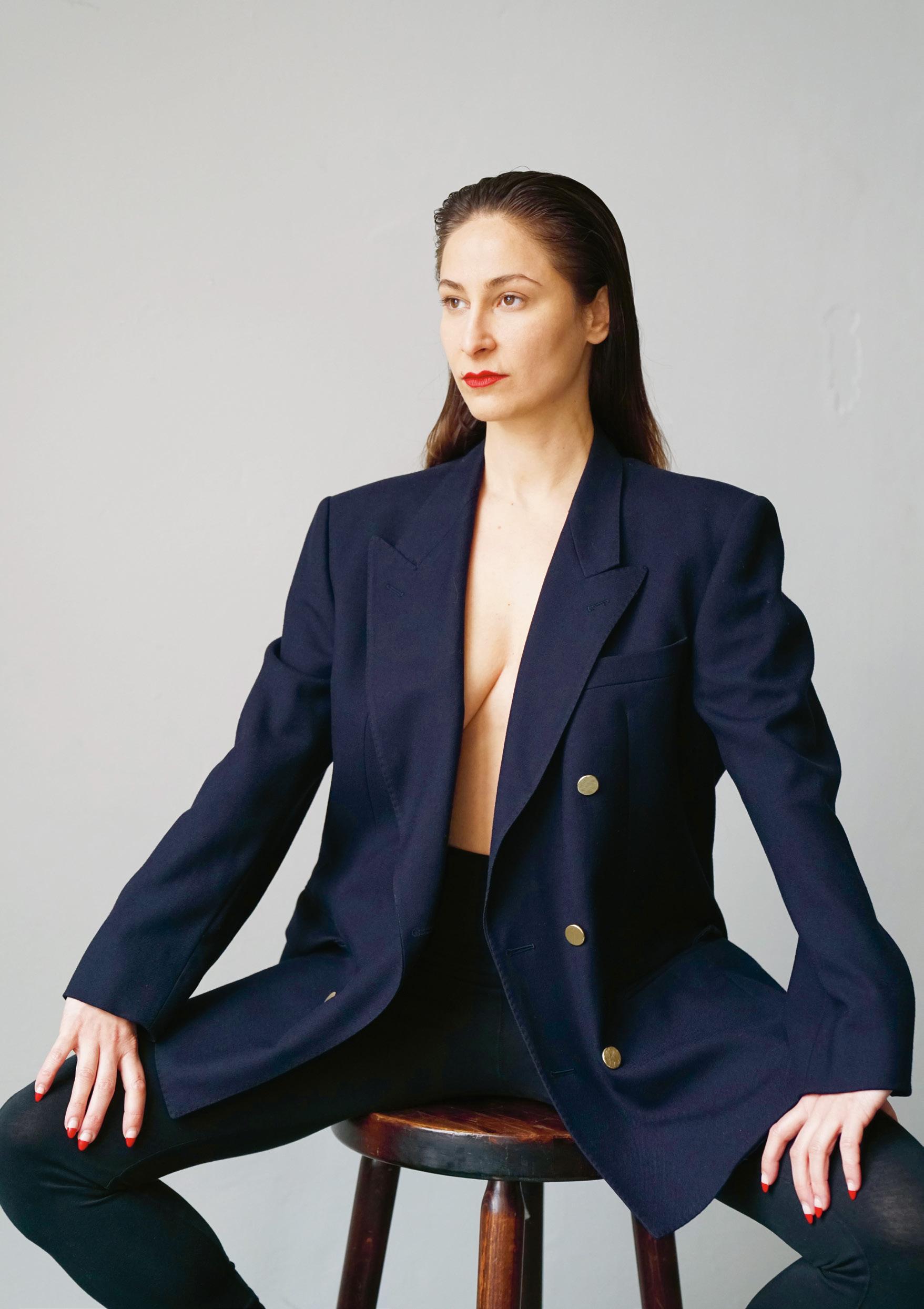






An alien is sitting on a chair and talking. It is telling us about itself, where it is from and why it is here now. It is going through what generations of female aliens have gone through: its back hurts, the alien has been bending over all its life, to breaking point – kaput. When the alien finds itself within a circle of top feminists (whose feminism comprises not having a cleaning lady), its pain bursts forth. It tells a story of precarious lives and burst spines, illegal cleaning in strange houses together with her mother, grandma and aunt. It is the start of a galactic coup: traditional clichés about fleeing and arriving are demolished and boundless energy is set free for ‘Yugofuturism’, as author and actor Mateja Meded labels her tragicomic monologue.





13 / 14 / 15 June, 8 pm, 16 June, 6 pm and 9 pm
Kosmos Theater
German
English surtitles approx. 70 min
Q&A
14 June, following the performance
Please note age recommendation 14+
Text, Concept, Performance, Direction, Stage, Costume Mateja Meded Voice over Mika Amsterdam, Maria Hofstätter, Anna Laner Dramaturgy Anna Laner Translation surtitles Lucy Jones (English) Surtitles Leoni Reilly Lights Dulci Jan Sound Karl Börner
Coproduction Wiener Festwochen | Freie Republik Wien, Kosmos Theater, Mateja Meded
Premiere June 2024, Wiener Festwochen | Freie Republik Wien
MILO RAU IN CONVERSATION WITH MATEJA MEDED
Milo Rau. So, Mateja, I’ll start in a minute by asking you some questions. Then we’ll turn this into a short text for the playbill and you can edit it. I always ask three very simple questions. First question: What’s cunt-slime-power against predatory kaputtalism about? Just the title has caused tickets to sell out incredibly fast and even the Austrian National Council has taken notice.
Mateja Meded. So the main themes of the play are people escaping war and racism towards Slavs and it’s about an alien with a bomb on her way to the theatre. Actually, it’s a tragicomedy. Everything is completely intersectional and feminist, but of course, those aren’t words I wanted to have in the play. But it’s also about, as the title suggests, feeling desire and being turned on.
M.R. You mention words like “escaping war”, “intersectionality” and “theatre”. All words, as you rightly say, that no one wants to hear because people might think: ok, here comes a monologue about escaping war, that’s psycho and I’ve heard so many of these already. What’s different about your play?
M.M. I think all the time about how minorities can tell their stories without re-traumatising other minorities. And without softening up these topics for the white middle-classes and without retelling the atrocities we’ve suffered in a realistic way, but through dramatic art. I have a bit of an issue with using people who have been through something but who don’t have real dramatic skills. They’re just put there, told to go ahead, and it’s called “authentic”. I think “authentic” is really horrible. The question is:
what dramatic means can we use to talk about certain things, I mean, using visual means as well as text. And I think the most important thing is to find a way to make it sensual and humorous too. It’s a real dilemma. How can we tell our stories in an empowered way without playing to the white middle-class audience? We’ve internalized it like this … we have to deprogram ourselves again.
M.R. When I read the table of contents, I had the impression that your play is a meta-text about exactly this question. Like, a short theory of aesthetics on deprogramming and empowerment.
M.M. It’s a monologue that was born from the absolute urgency to have a voice – because people who escape war are always deprived of their voice and that’s why they never really get to talk about what happened to them. Healing can only start if we decide in an empowered way how we tell our stories. And not just tragically –it can be funny too. Not all of it is tragic. My entire approach to feminism and my will to survive come from my family’s persecution. It gives you a rebellious attitude. It’s like: ‘Just you listen to this!’ That’s why I started reading everything on the subject, including academic texts, and seeing how it’s done by others in films or performances. How did they crack this code of how to tell their story? Films like Black Panther or Everything Everywhere All at Once are great references, for example.
M.R. And what’s interesting for you about Black Panther? Is there good rhetoric in it or what did you take away from it?
M.M. It always makes me think of Alfred North Whitehead and Speculative Theory. It says that we describe the present time in the future and that we assert a reality that doesn’t exist at all and bring it into the present, thereby changing the present.
M.R. So, we shape the present according to the future …
M.M. We shape the future in the present by asserting a different present.
M.R. Yes, I see.
M.M. That’s not exactly what I manage to do in my play, but it’s what I latch onto again and again, and keep asking myself: Is the way I’m telling this story OK, or could there be something more absurd, funnier or more futuristic to it?
M.R. And now a completely different question. Anyone reading this playbill is one of the lucky few who managed to get a ticket. The FPÖ asked the Austrian Vice-Chancellor what “Cunt-Slime Power” means and why it has to appear in the title. We then posted: Yes, we want to know that too. And then funnily enough, the ViceChancellor liked our post, and you did too.
M.M. Yes, they’re supporting us with little heart emojis.
M.R. So how did you come up with this killer title? cunt-slime power against predatory kaputtalism … I mean, it’s just a brilliant, brilliant, brilliant title! What are you trying to say with it?
M.M. In 2020, Corona started, as you know, and a week before lockdown began, all of my contracts at the Maxim Gorki Theatre ended. I had some things planned, but then during lockdown, no one contacted me. No one replied to my emails, people cancelled things without telling me and I had €8,000 to live off in the whole of 2020. I was living illegally in my apartment because I couldn’t afford it and that’s why my contract was terminated without notice. My phone and internet were also blocked because I couldn’t afford them anymore.

…
it’s the system we live in, which isn’t designed for someone like me to break out of.
And so I lay all alone in bed during Corona and the only hobby I had left was masturbation. I just read all these academic texts and masturbated. And then I thought, well, that’s actually the way it should be. I knew that I was alone in my room because of capitalism. I did research into the patriarchy and so on and came to the conclusion: hey, patriarchy isn’t some old white man, one person; it’s the system we live in, which isn’t designed for someone like me to break out of. It’s programmed to destroy me when I start finding my voice. Even the fact I exist, that I’m alive, is a provocation. Mixed into this are feelings of survivor’s guilt because I survived the war. And I thought, no, I’ll just leave all that out, I just want to have orgasms. If it doesn’t give me orgasms, money or satisfaction, then I don’t want it in my life. What I want to do is make a kind of art that’s sensual in some way. Art that’s
sexy because, I think, women are always forgetting to have orgasms. It always comes in second or third place. I thought: squirting is actually an emancipatory act. If I’m not squirting, I’m not flirting. I don’t believe in revolutions. I believe in hacking the system and in inspiring others to do so. When I perform this play, I hope of course that women find an even deeper access to their sexuality, if they don’t have it already. Because a new sexuality shapes a new femininity. You realise it’s a muscle that can spread and stretch, just like a dick. Capitalism is basically a dick.
M.R. Because it keeps getting bigger and bulges or what?
M.M. Because it consumes everything and has to leave its semen everywhere and on everything. It’s interesting, for example, how we tell stories. Beginning, middle, end. It’s an arc – like a jet of male piss and the male orgasm. It comes up, then it goes down again and then it’s all over.
M.R. Is that in the play? These are really interesting theories. I’m glad they’re in the play because …
M.M. And female orgasms, for example, go like booooom, boom, boom, boooooom.
M.R. Ah, I see, this isn’t a storyline. It’s kind of like a rash from a truth detector.
M.M. That’s what female orgasms are like. So, the way you tell it isn’t a storyline, but an attempt to find a new narrative, but also a form for this narrative.
M.R. That’s great – like a theory. So, I think we should come to this conclusion quickly in the transcription.
M.M. Because the rest of it is so uninteresting!
M.R. No, it’s great too but it’s more a kind of foreplay for the theory that comes at the end. So, the recording will start here, now it’s off.
M.M. Shall we say goodbye then?
M.R. Yes, thank you, thank you for your time and sorry for the scheduling issues. But now we have the interview and we can transcribe it and turn it into a text.
Mateja Meded, born in Yugoslavia, has lived in Germany since 1992 and is an actress, author, director and filmmaker. During her studies at the Babelsberg Film University, she already worked at the Maxim Gorki Theatre in Berlin. There she was a member of the ensemble that developed and wrote the theatre play Common Ground, which won several awards. In 2018, she was nominated as best actress at the Socially Relevant Film Festival New York. In 2021, she was part of the digital theatre at Theater Neumarkt in Zurich with her Shitfluencers. The results were short theatre films that Mateja Meded wrote, directed and edited. In the same year, her video installation was shown in a group exhibition at the Venice Architecture Biennale. Mateja Meded is currently working on the film trilogy Hack the system. She writes regularly as a journalist, gives lectures on flight, art, politics and migration and presents small performances in art institutions. She also works as a performance artist, for example in 2023 at the Kunsthalle Baden Baden under the direction of Cagla Ilk. 2024 sees the release of the cinema film Der Soldat Monika, in which she can be seen alongside Maria Hofstätter and Philipp Hochmair.
PUBLICATION DETAILS Owner, Editor and Publisher Wiener Festwochen GesmbH, Lehárgasse 11/1/6, 1060 Wien P + 43 1 589 22 0, festwochen@festwochen.at | www.festwochen.at General Management Milo Rau, Artemis Vakianis Artistic Direction (responsible for content) Milo Rau (Artistic Director) Text credits The interview was conducted by Milo Rau on 3 April 2024. Picture credit © Boris Kralj Produced by Print Alliance HAV Produktions GmbH (Bad Vöslau)


Main sponsors Public funding body














